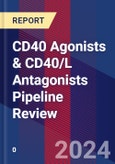This product provides basic information on drug candidates in research and development targeting CD40 or CD40 ligand
This product consists of:
- Competitors are described in a tabular format covering drug code/INN, target(s)/MoA, class of compound, territory of main competitor, indication(s) & R&D stage.
- Project History with links to the source of information (press release, homepage, abstracts, presentations, annual reports etc.).
- One-month online access to La Merie Publishing’s database for CD40/L-targeted drug candidates (prerequisite: access to the internet).
This product is delivered on the very same day of purchase by e-mail containing competitor and project history reports in PDF format and database credentials. Reports are prepared on the same day.
Because of its essential role in immunity, one of the best characterized of the costimulatory molecules is the receptor CD40. This receptor, a member of the tumor necrosis factor receptor family, is expressed by B cells, professional antigen-presenting cells, as well as non-immune cells and tumors. CD40 binds its ligand CD40L, which is transiently expressed on T cells and other non-immune cells under inflammatory conditions. A wide spectrum of molecular and cellular processes is regulated by CD40 engagement including the initiation and progression of cellular and humoral adaptive immunity.
The transmembrane protein receptor CD40 is a member of the tumor necrosis factor (TNF) receptor superfamily and is involved in the co-stimulation of immune cells. CD40 is expressed by antigen-presenting cells (APCs) including dendritic cells (DCs), B-cells, macrophages, and monocytes. It has the ability to “wake” DCs to prime effective cytotoxic T-cell responses. The binding of an anti-CD40 antibody to CD40 on antigen-presenting cells (i.e., dendritic cells, monocytes, and B-cells) is believed to initiate a multi-faceted immune response that enables multiple components of the immune system (e.g., T cells, macrophages) to work in concert against cancer.
CD40 is an important target for immunotherapy, as it plays a critical role in the activation of innate and adaptive immune responses. Effective anti-CD40 antibodies provide an ideal therapy alternative in combination with other immuno-oncology (IO) antibodies. When delivered systemically, CD40 agonists have produced adverse events that may limit their use.
A number of novel CD40 targeting biologics are in preclinical and clinical development using constructs (multimeric, bispecific, targeted delivery) to overcome systemic safety issues by limiting activation to the tumor microenvironment.
The ligand of CD40, known as CD154 or CD40L, is a type II transmembrane protein that is constitutively expressed on hematopoietic cells such as dendritic cells, macrophages, and B cells. Engagement of CD40 by CD40L expressed on T cells results in the production of proinflammatory cytokines, induces T helper cell function, and promotes macrophage activation. The involvement of CD40 in chronic immune activation has resulted in CD40 being proposed as a therapeutic target for a range of chronic inflammatory diseases. CD40 antagonists are currently being explored for the treatment of autoimmune diseases.








